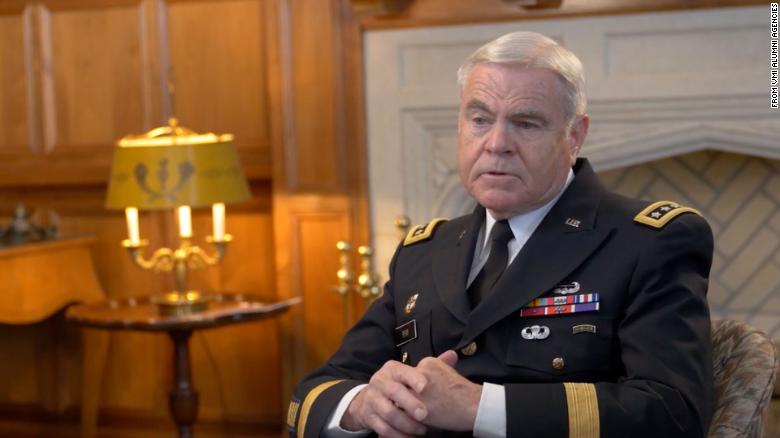The superintendent of the Virginia Military Institute resigned on Monday, a week after state leaders called for an investigation into “a culture of ongoing structural racism” at the school.
General J.H. Binford Peay III, 80, who has led the school since 2003, offered his resignation after learning that the governor and other state legislative leaders had lost confidence in him and wanted his resignation, he wrote in a letter to VMI Board of Visitors President John W. Boland.
“It has been the honor of my life to be the Superintendent of VMI for over seventeen years. I always have and always will love the Institute, all of our cadets, alumni and the entire VMI family,” he wrote.
Boland confirmed the resignation and praised Peay’s 17 years as superintendent.
“General Peay is a great American, patriot, and hero. He has profoundly changed our school for the better in all respects,” Boland wrote. “General Peay and his wife Pamela serve as a model of dedicated service to our nation and the Commonwealth. We wish them well in their future endeavors.”
Peay’s resignation comes after The Roanoke Times in June and The Washington Post earlier this month detailed allegations by Black students and alumni against the school.
Based in Lexington, Virginia, VMI is a public military college that has an enrollment of about 1,700 students. Last year, VMI counted 102 Black students among its enrollment — about 6% of the student body.
Former cadets described to the Roanoke paper White cadets’ overt racism, being forced to re-enact a Civil War battle in which VMI cadets took part and the now-abandoned practice of requiring first-year students to salute a statue of Thomas J. “Stonewall” Jackson, a former VMI professor, Confederate general and slaveholder.
The Washington Post story outlines numerous student and alumni allegations mentioned in the state leaders’ letter, as well as a 2017 incident in which White cadets dressed up in boxes, representing the southern border wall, bearing a slur against Mexicans.
State leaders direct review of VMI
Last week, state leaders wrote a letter to VMI’s governing Board of Visitors, citing the reports and saying that the school’s values of honor, sacrifice, dignity and service “do not extend to all students.” The letter cites reports of “vicious attacks on social media,” a sophomore threatening to lynch a fellow underclassman and a professor fondly reminiscing over her family’s involvement in the Ku Klux Klan.
It further claimed the state-run military college in Lexington continues to embrace the Confederacy, as well as “an inaccurate and dangerous ‘Lost Cause’ version of Virginia’s history.” The “Lost Cause” ideology asserts the Southern war effort was heroic and that states’ rights, not slavery, was the Confederacy’s principal cause, despite overwhelming evidence to the contrary.
“It is long past time to consign these relics to the dustbin of history,” the letter said. “This culture is unacceptable for any Virginia institution in the 21st century, especially one funded by taxpayers.”
The letter was signed by, among others, Gov. Ralph Northam, Lt. Gov. Justin Fairfax, Virginia House Speaker Eileen Filler-Corn, state Senate President Louise Lucas, Attorney General Mark Herring and Delegate Lamont Bagby, chairman of the state Legislature’s Black caucus.
In a response, Boland said he welcomed an “objective, independent review of VMI’s culture” but said that the allegations had more to do with an individual’s lapse in judgment than the institute’s culture.
“These incidents were perpetrated by few individuals and were in no way condoned by the Institute,” he wrote. “Virtually all colleges in the 50 states can point to inappropriate behavior by their students or faculty members. VMI is not immune. However, systemic racism does not exist here and a fair and independent review will find that to be true.”
Fairfax, the lieutenant governor, responded to Peay’s resignation in a statement Monday expressing hope for VMI’s future.
“The departure of one person does not fix a systemic problem we must confront in a comprehensive manner,” he wrote. “We can not continue to pretend that racism directed at African American cadets are singular incidents disconnected from a culture of longstanding systemic racism.”
>>>>

